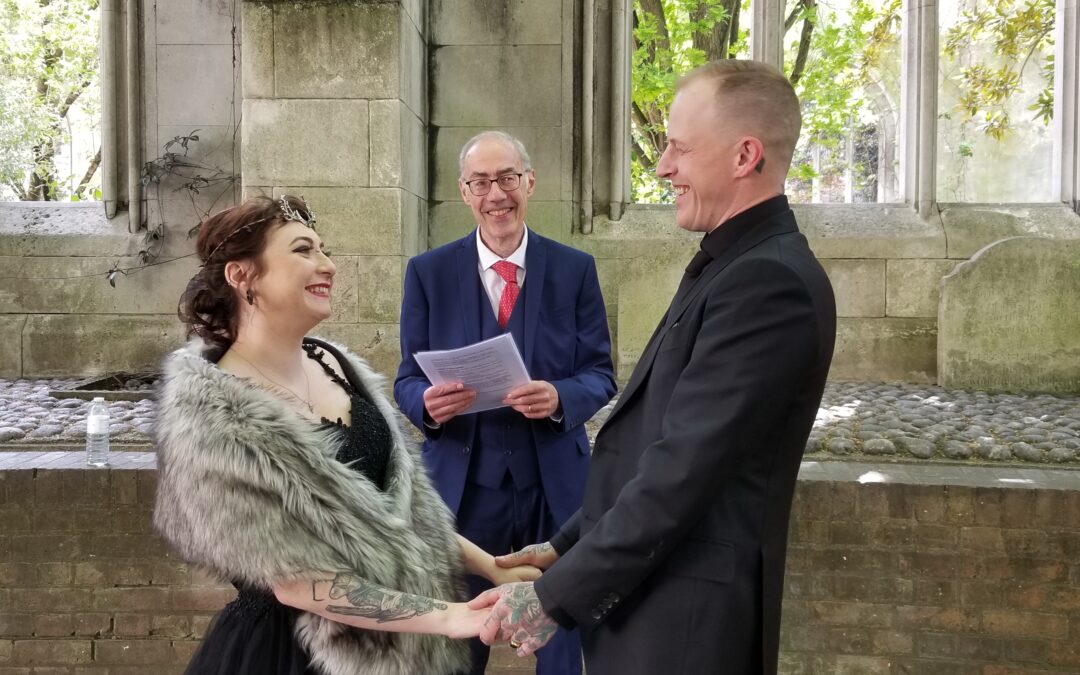
by Michael | Sep 19, 2023 | Blog
Many people assume that an elopement is very cloak-and-dagger. The bride (or groom) has been forbidden to marry his/her loved one and is locked away. Bravely, the prisoner escapes in the depths of the night and, together with the beloved, somehow goes to Gretna Green. There they find an officiant and then present parents etc. with a fait accompli.
All very exciting and romantic!
It can indeed be like that. However, my experience of elopements is a little different.
No, I haven’t eloped myself. But I have been asked to conduct an elopement ceremony – in fact, two.
In one case, the couple (American) were travelling through Europe on a Rhine river Cruise. They already had their wedding booked (register office) in the States for their return, but thought it would be a lovely thing to arrange a blessing ceremony with me at Cologne, one of the ports of call. It was just to be the three of us, but pretty well a spur-of-the-moment decision. Hardly an elopement, I’d venture to say, although it did offer some of the expected elements.
In the other case, the couple were also American. This time they were travelling for just over a week to the UK (predominantly London). Like the first couple, they had the legal ceremony booked for their return to the US.
They were both very shy and the idea of any kind of public ceremony featuring them was intimidating.
Additionally, unlike the case of the first couple, there was some actual secrecy involved. Relations between them and their respective families were not good, and not all parties were being informed of the match. At least, not until after the register office ceremony.
The event in London would be just for the two of them, with myself as celebrant and a photographer also in attendance. Such a ceremony was something they could both enjoy, feeling relaxed, and we could put together a suitable, unique and beautiful ceremony.
In truth, it was one of the most moving sights I have witnessed, seeing the obvious love radiate between the two of them. They were so grateful and happy. But I don’t know how they fared with their families, once the latter found out the news!
So an elopement doesn’t have to be cloak-and-dagger; it doesn’t have to take place in Gretna Green. It can be relaxed and a delight.
Why not try it?!
I’d be happy to have a chat with anyone contemplating such a move.
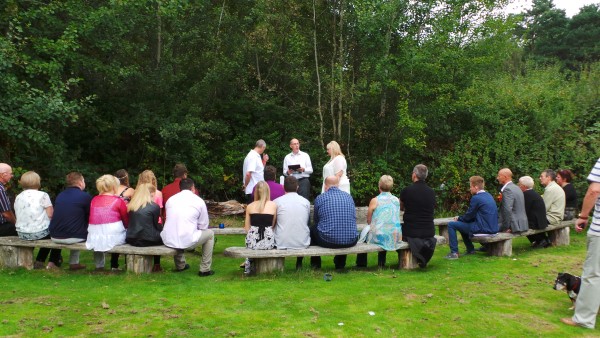
by Michael | Sep 11, 2023 | Blog
However you define it, we’ve reached Autumn now. The days are shorter, children are back at – or preparing for – school. We’re on the path towards the dark damp, cold days of Winter.
Sounds depressing, eh? Well, it needn’t be. Especially if you have something to look forward to. Personally, next Summer holds a big birthday for me as well as our silver wedding anniversary. So we’ve booked a special trip, and that prospect will help sustain us through the more miserable days of Winter.
However, you may not be in the same position as me, however. What can you do to bring some light to the forthcoming gloom?
It may not be such a crazy idea to plan and book a special ceremony for yourself. This could be a Vow Renewal or even a handfasting (or both!).
What this could mean is that you pick something that matters to you and mark it with an event. An example might be a wedding anniversary, especially one ending in -5 or -0. Or you might want to celebrate a new arrival into your family (this doesn’t necessarily have to be a baby). Perhaps somebody has recovered from serious ill health. Or it might be that somebody is starting a new job or moving away, and these could all merit a ceremony.
You might incorporate a ritual (or two) in your ceremony. (Your celebrant will be happy to advise you.) That way, if you want particular people to participate, they will be able to do so.
You can also include a favourite reading or two, and have input from folk special to you.
It won’t be like a wedding, where there is paperwork to complete and conditions to comply with. You can relax and do it just as you please. That might mean hiring a venue or doing it in your back garden. The possibilities are virtually endless.
The point is: you (and your celebrant) can put together a meaningful, beautiful ceremony that will hit the mark. This will be something you – and your guests – will really enjoy and remember far into the future.
So you can devote those dark days ahead to planning something worthwhile and unique.
Do have a chat, if this idea interests you.

by Michael | Sep 4, 2023 | Blog
It’s certainly not easy, planning a wedding. And knowing when to do what is a mystery to most. However, I do have a few pointers and ideas that may really help.
Venue
Of course, a lot depends on the size of the occasion and the venue. If you’re holding your event in the back garden, there are still suppliers to be booked – possibly, well in advance. However, things in many ways will be simpler. You do need to take special care to comply with health and safety, but you can at least have a venue where you are comfortable and which you (hopefully!) love.
When planning an open-air ceremony, you will need to factor in the weather. You may need a Plan B in case of rain, and you will have to be prepared for heat and strong sun. Whereas the venue may only need permission from the landowner (or a fee), you may not need to book it too much in advance.
A hotel or castle may well be a different story. You will probably have to reserve your place at least a year in advance and may have to be flexible with date and even time.
Other considerations
If you’re holding a church wedding, you would be advised to book up well in advance, and the same certainly goes with the officiant. This applies to independent celebrants as well as vicars. Allow a year to avoid disappointment.
Caterers will need plenty of notice, so I would expect them to need a year’s warning too. Similarly, with the entertainment you may be choosing.
You could be booking florists, make-up artists, hairdressers, photographers/videographers, wedding planners etc. All of these could do with a year’s notice.
Dress/suits will need thinking about, but can probably best be bought/hired near the big day, to allow for changes in body weight!
Some people do manage to book quite last-minute, although I recommend about a year’s notice for most suppliers. That way, you should secure your first choice.
I hope that my idea to set you thinking has been successful. For further discussion, feel free to contact me.
photo: aiony-haust-xCQm5_9aro0-unsplash.jpg
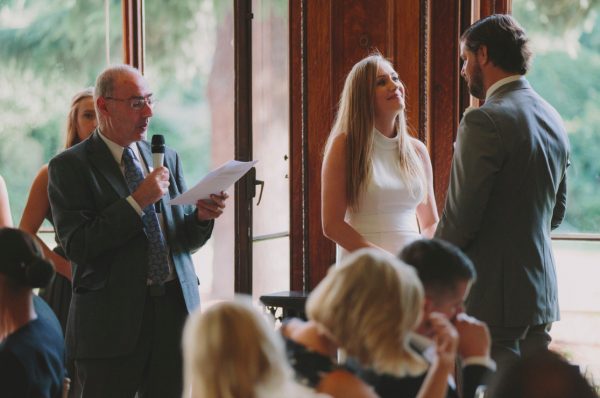
by Michael | Aug 28, 2023 | Blog
People ask me what sort of ceremonies I conduct. The answer is straightforward. I mainly “do” – ie put together and lead – weddings, funerals, handfastings, namings and vow renewals. There are others too, but they are less frequent.
“What’s a vow renewal and why have one?” is not an uncommon question.
I’d like to try and answer that in this blog, if I may.
Why Have a Vow Renewal at all?
A vow renewal is what the name suggests, ie a renewing of vows (usually marriage vows). This can be because a lot of time has elapsed since the original sharing of vows. Promises made then may not be so relevant now.
It may be that there have been some tumultuous changes in the partner’s lives. Children could be on the scene now; recovery from serious illness or financial disaster may prompt the desire to renew vows. It can even be to mark the end of infidelity!
It may accompany the marking of a special anniversary (especially one ending in -5 or -0).
What does a Vow Renewal involve?
Unlike a wedding, say, there are no strings attached to this ceremony. You don’t need a registrar; you can hold it wherever you want (in reason!); and you can have the ceremony that you want (equally, within reason!). The tone is up to you. Participation is open to whoever you want to join in. You can choose readings (and readers). You can incorporate ritual (a unity ceremony is popular), and again, your celebrant can make suggestions for you.
The bottom line, though, is that there will be a declaration of your vows in there somewhere. You can – but don’t have to – write these yourself. (Your celebrant will help you.)
Remember, you can choose the venue – indoors or out. It can be in nature, in a hotel, by a canal – wherever you are allowed to go. You can incorporate humour into the proceedings. You can make it as religious (or not) as you want and as formal as you like.
Enjoyment should almost be guaranteed.
Maybe you can see why I love Vow Renewals and am convinced that they have a place among our life-cycle events.
I’d be happy to speak more about this, if you want to contact me.
photo: mckinley_rodgers.com
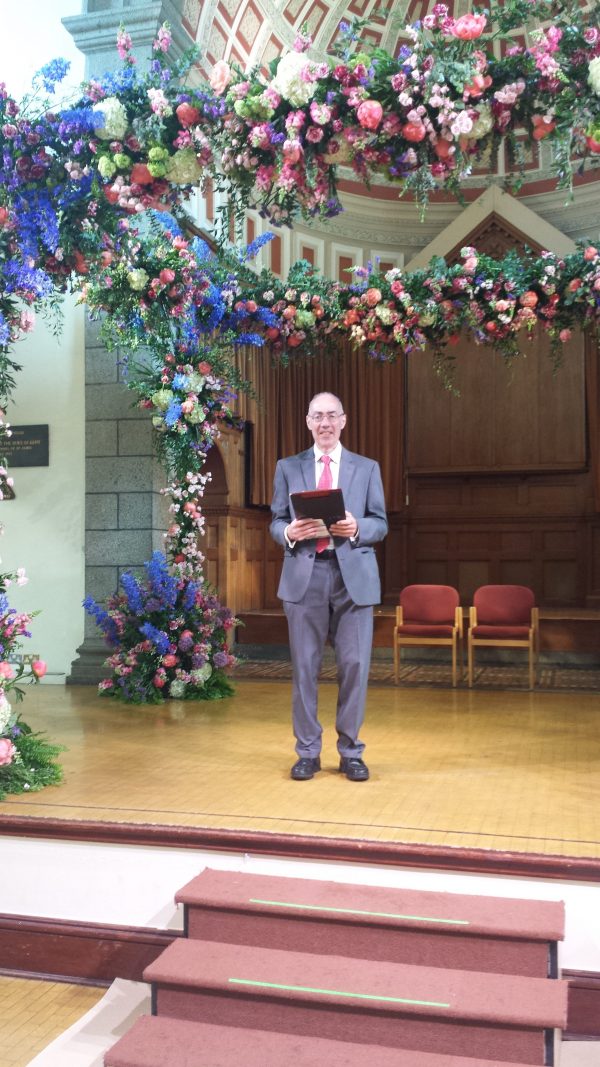
by Michael | Aug 21, 2023 | Blog
Value for money is extremely important. When it comes to a wedding, there are potentially a lot of suppliers to be hired. You don’t want to hire one just because “most people do”. However, you don’t want to miss out on one who could save you a lot of work and peace of mind. The Wedding Planner Debate falls under those categories.
Of course, if you’re having a micro-wedding, perhaps in the back garden, with a handful of guests, you’re not likely to need a wedding planner. Equally, if you’re having a medium-sized affair at a hotel, say, the booking may well come with an in-house event planner. The latter may suffice.
Avoiding the Wedding Planner
So you may not use a planner:
- if you can’t afford it
- if you want to do everything (such as sourcing and hiring suppliers) yourself
- you are able to use a great in-house event co-ordinator
- you haven’t found one who shares your vision
Contemplating a Wedding Planner
You should give some thought to hiring a wedding planner in any of the following scenarios:
- if you are holding a big (especially destination) event.
- If you’re using a dry-hire or marquee wedding. Everything needs to be organised from scratch for these.
- A wedding planner can take an unbiased and objective view of issues, and may actually end up saving you money.
- The wedding planner may also save you money because they have a network of trusted professional contacts who they regularly work with.
- You don’t have to hire a wedding planner for weeks at a time. Some will work with you for just the week of the wedding and some can be hired for the big day alone. Obviously, you’ll have to judge which will work best according to the size of your function.
- A good Wedding Planner will have experience and wisdom to fall back on, when advising you or suggesting ideas. They probably have learned over time what works best.
- Because they usually handle the suppliers (notably, on the day itself), they will take the stress off you. They are being paid to do the worrying and to make any snap decisions that may be necessary.
So although each occasion is different, and my advice only applies in certain circumstances, I would certainly advocate serious consideration of employing a Wedding Planner. A professional, but sympathetic, experienced person may be worth their weight in gold.
In my celebrant work, I’ve come across some astonishingly hard-working, but good-humoured and accomplished professional Wedding Planners.
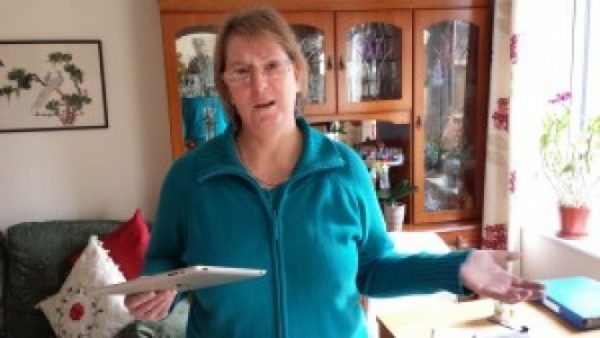
by Michael | Aug 14, 2023 | Blog
I realise that there can be as many answers to this question as there are different circumstances. So, if your opinion differs from mine, that’s OK! (You’re welcome to let me know what you are finding most trying.)
In my experience, however, I’d emphasise two danger areas: money and parents.
Budget
When planning a ceremony, you have to be singing from the same hymn-sheet. Decide how much money will be available. Talk this over with the relevant people and do your best to reach a compromise, if you can’t agree on everything.
An example of an issue that needs sorting may be how much religion (if any) you want in your ceremony. Can you manage some give-and-take, if you’re not in full agreement? So, could the ceremony be mostly secular (but spiritual) with a conventional prayer or two included?
Or, depending on the ceremony, could you make it secular, but with someone doing a (religious) blessing?
There’s also ritual – you could borrow from various traditions, if you wanted. Some are “heavier” than others, so you could find one (or more) to suit.
These are things your celebrant could helpfully discuss with you.
My final point about expenditure is that, although you should not exceed your budget, you may find something you want that costs a little more than you planned for. It may be possible to accommodate this by juggling your costs. For example, you could possibly afford the celebrant of your dreams (me, obviously!), if you picked a weekday for your ceremony (often cheaper) or chose flowers that are in season …
Parents
If your parents are bankrolling your event, or they have strong personalities and feelings about, say, religion, you will have to take their wishes into consideration. Again, you may be able to compromise a bit. Think it through before you draw up battle-lines! What can you afford to sacrifice (or include) for the sake of harmony?
The bottom line of the matter is that it is YOUR event and you should be able to have it the way you want. Sure, there may have to be a little that you’d rather not include, but your parents must accept that their role is to enable you to have YOUR day. You should be grateful and, where reasonable, amenable, but you want to end up with a day that is memorable for the right reasons!






